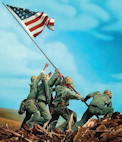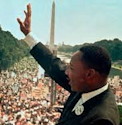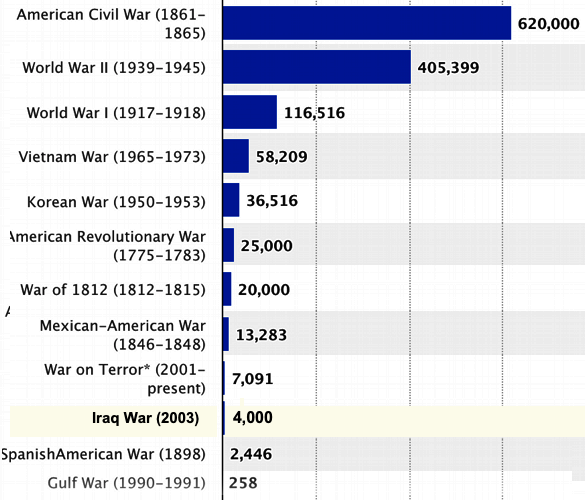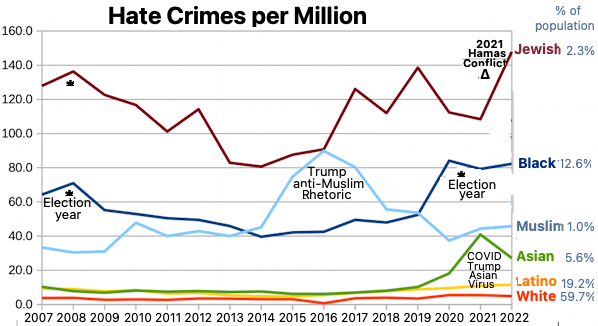last updated 12 November 2025
In 2025 I noticed several of my neighbors were flying their flags all year round. I put up flag pole and am leaving it up.

Our family has many ancestors who were early immigrants in the 17th century, fought in the American Revolution and made many sacrifices over 12 generations to get to my Grandson born in 2019, 12 generations later, and I wanted to list some of the things I thought he should know about the USA.
Contents:
Early Immigrants | Founding Principles, Declaration of Independence, Constitution | USA Historical Documents & Speeches | Laws, Famous Supreme Court Decisions | U.S. Democracy Rating | Wars
 A gift of friendship from the people of France to the United States "The Statue of Liberty Enlightening the World" in New York Harbor is recognized as a universal symbol of freedom and democracy. It was dedicated by President Grover Cleveland on October 28, 1886 on the 100th anniversary of our constitution.
A gift of friendship from the people of France to the United States "The Statue of Liberty Enlightening the World" in New York Harbor is recognized as a universal symbol of freedom and democracy. It was dedicated by President Grover Cleveland on October 28, 1886 on the 100th anniversary of our constitution.
The plaque on the base is the sonnet "The New Colossus" by Emma Lazarus.
The sonnet is a direct address from the statue, presenting it as a "Mother of Exiles" who welcomes those seeking refuge and a new life in America.
It concludes.
"Give me your tired, your poor,
Your huddled masses yearning to breathe free,
The wretched refuse of your teeming shore.
Send these, the homeless, tempest-tost to me,
I lift my lamp beside the golden door!"
|
 The flag raising at the capture of Iwo Jima on February 23, 1945, is an iconic image, captured by Associated Press photographer Joe Rosenthal. It quickly became a symbol of American resilience and resolve during World War II.
Iwo Jima was a key strategic point in the final stages of the Pacific War at the end of WW II.
The flag raising at the capture of Iwo Jima on February 23, 1945, is an iconic image, captured by Associated Press photographer Joe Rosenthal. It quickly became a symbol of American resilience and resolve during World War II.
Iwo Jima was a key strategic point in the final stages of the Pacific War at the end of WW II.
It is depicted by a statue in the Marine Corps War Memorial at Memorial Park in Arlington VA.
The U.S. sacrificed over half a million lives in WW I and WW II, to save over 50 countries from the tyrany of a few totalitarian regimes.
My Early Imigrants:
I feel a strong connection to the USA. I have many ancestors who were early immigrants in the 17th century.
Joseph Cobb my 11th Great Grandfather came from the Netherlands to the Jamestown Settlement in 1613.
George Soule my 9th Great Grandfather came from England to the
Plymouth Plantation on the Mayflower in 1620.
He celebrated the first thanksgiving in 1621
with at least 90 Wampanoag people, the local residents, and 52 English people who celebrated a successful harvest. The colonists had a brutal first year and were saved by the Wampanoag, who taught them how to plant local crops.
It took 150 years and 70 more immigrant ancestors to have a country and a flag.
My Daughter-in-Law's 8th Great Grandfather, Joseph Babineau, moved from France to Fort Pentagoet, Acadia (nouvelle France), the french colony which covered todays Nova Scotia, Prince Edward Island, part of New Brunswick Canada and Maine. The French were expelled from the southern area by the British in 1755.
So my Grandson has more early North American immigrants ancestor than I do. His Grandmother is a first generation immigrant, so his ancestors span the range. He's a real American with 8 different nationalities represented by his Great grandparents: English, Taiwanese (Chinese),
Italian, French, Polish, German, Irish, Scottish.
Several of my early ancestors fought in the American Revolution. Jacob Gard, my 5th Great Grandfather, was a captain New Jersey Militia in Morristown. John Jones Sikes, My 3rd Great Grandfather, served in New York.
United States founding principles
Founding principles which have allowed us to be successful.
Iceland, Switzerland, and the United States are often cited as having the longest-standing democratic systems in the world. We can thank our founding fathers for a government that supported this stability.

- Democracy - Majority Rule/ Minority Rights, Consent of the Governed
- Liberty - Free speech, freedom of the press, freedom of religion, and freedom of assembly
- Equality - Respecting the rights and dignity of all.
- Justice, Upholding of what is fair and right.
This is a poster I made for the front of the flag pole in my front yard with the 13 star Hopkinson Flag, The first flag, developed by a NJ founder, Francis Hopkinson in 1777. It was likely first flown where our army was camped in the summer of 1777 at the Middlebrok Encampment in what is now Martinsville, NJ on the same ground where I lived for 40 years from 1978 to 2018.
I am a lifetime member of the Washington Campground Association.
Quotes from historical documents and speeches you should know
- Declaration of Independence July 4, 1776
"We hold these truths to be self-evident, that all men are created equal, that they are endowed by their Creator with certain unalienable Rights, that among these are Life, Liberty and the pursuit of Happiness."
The Declaration of Independence, formally The unanimous Declaration of the thirteen united States of America in the original printing, is the founding document of the United States. On July 4, 1776, it was adopted unanimously by the Second Continental Congress, who were convened at Pennsylvania State House, later renamed Independence Hall, in the colonial city of Philadelphia. These delegates became known as the nation's Founding Fathers.
Congress appointed the Committee of Five (John Adams, Benjamin Franklin, Thomas Jefferson, Robert R. Livingston, and Roger Sherman) to draft and present the Declaration. Adams, a leading proponent of independence, persuaded the Committee to charge Jefferson with writing the document's original draft.
- U. S. Constitution June 21, 1788
The U.S. Constitution is the oldest written national constitution still in use. It has served as a model for many other countries.
The US Constitution was written by 55 delegates to the Constitutional Convention in Philadelphia, Pennsylvania, during the summer of 1787. The delegates were elected by the states to revise the Articles of Confederation, the country's first written constitution, instead they started from scratch. Each state got 1 vote on provisions to be included.
While the U.S. Constitution is the result of the work of many individuals, James Madison is often called the "Father of the Constitution" due to his significant role in drafting and advocating for it. George Washington, Benjamin Franklin and Alexander Hamilton were other significant contributors.
Many nominated representatives like Thomas Jefferson decided not to attend.
The Federalist Papers, is a collection of 85 articles and essays written by Alexander Hamilton, James Madison, and John Jay from October 1787 to April 1788, urging the citizens of New York to ratify the new United States Constitution.
See Federalist Papers: Primary Documents in American History
Benjamin Franklin stated in his closing speech that he agreed to the Constitution "with all its faults" because he recognized that no assembly of imperfect men could produce a perfect document, and a general government was necessary for the country's future. While he personally held reservations about some aspects, he urged his fellow delegates to set aside their objections for the public good and to ensure unity in endorsing the new Constitution, believing it was the best possible outcome. He encouraged many who had disagreements with it to vote yes.
Imperfect Men, Imperfect Results: Franklin, a wise elder, understood that human nature, with its inherent prejudices, errors, and selfish views, would prevent any document from achieving perfection.
Preamble to the US Constitution:
"We the People of the United States, in Order to form a more perfect Union, establish Justice, insure domestic Tranquility, provide for the common defence, promote the general Welfare, and secure the Blessings of Liberty to ourselves and our Posterity, do ordain and establish this Constitution for the United States of America."
On September 25, 1789, the First Congress of the United States proposed 12 amendments to the Constitution.:
The 1789 Joint Resolution of Congress proposing the amendments is on display in the Rotunda in the National Archives Museum. Ten of the proposed 12 amendments were ratified by three-fourths of the state legislatures on December 15, 1791.
Key provisions include the separation of powers into three branches (legislative, executive, and judicial), federalism which divides power between the federal government and states, and a system of checks and balances to prevent any one branch from becoming too powerful. Additionally, individual rights, especially in the Bill of Rights (The first 10 Amendments to the Constitution.), and the amendment process. These provisions aim to create a limited government that protects individual liberties and prevents tyranny.
See: US Constitution Articles and Amendments
Statements from a few of the many important leaders in our history.
I selected presidents who had some advice for the country in their fairwell addresses or other means and Lincoln and Kennedy because they were well respected leaders who made the ultimate sacrifice.
- President Thomas Jefferson (1801-09)

Writing :
- The Declaration of Independence.
- The "Tree of Liberty" quote in a 1787 Letter to William Smith, John Adams son-in-law.
"What country can preserve it's liberties if their rulers are not warned from time to time that their people preserve the spirit of resistance? The tree of liberty must be refreshed from time to time with the blood of patriots and tyrants."
I suppose you could say the Civil War (1861-65) and today represent represent those times. Fortunately we have matured beyond the need for blood now. Well, almost.
See 2024 comments in The Conversation on Nick Bryant in his new book, The Forever War: America's Unending Conflict with Itself..
- President Abraham Lincoln (1861-65)

Gettesyburg Address November 1863
Lincoln delivered the speech, during a formal dedication of Soldiers' National Cemetery, now known as Gettysburg National Cemetery, on the grounds where the Battle of Gettysburg was fought four and a half months earlier, between July 1 and July 3, 1863, in Gettysburg, Pennsylvania. In the battle, Union army soldiers successfully repelled and defeated Confederate forces in what proved to be the Civil War's deadliest and most decisive battle, resulting in more than 50,000 Confederate and Union army casualties in a Union victory that altered the war's course in the Union's favor.
Total casualties from the Civil War ranged from 620,000 to 750,000 or more; More than 2% of the US Population.
"Fourscore and seven years ago our fathers brought forth on this continent a new nation, conceived in liberty and dedicated to the proposition that all men are created equal. Now we are engaged in a great civil war, testing whether that nation or any nation so conceived and so dedicated can long endure. We are met on a great battlefield of that war. We have come to dedicate a portion of that field as a final resting-place for those who here gave their lives that that nation might live. It is altogether fitting and proper that we should do this. But in a larger sense, we cannot dedicate, we cannot consecrate, we cannot hallow this ground. The brave men, living and dead who struggled here have consecrated it far above our poor power to add or detract.
"
- President Dwight D. Eisenhower (1953-1961)
fairwell address. 1961 
In the councils of government, we must guard against the acquisition of unwarranted influence, whether sought or unsought, by the military-industrial complex. The potential for the disastrous rise of misplaced power exists and will persist.
See the complete address in the National Archives.
- President John F. Kennedy (1961-1963)

Inaugural Address January 20, 1961
"Ask not what your country can do for you - ask what you can do for your country."
YouTube
Some accomplishments:
- Ended the 1960-61 Recession
- Created the Peace Corps
- The Equal Pay (for women) Act of 1963
- Partial Nuclear Test Ban Treaty
- Established the Basis for the Civil Rights Act of 1964
- Martin Luther King Jr (1929-1968)
 "I Have a Dream" Speech 1963
"I Have a Dream" Speech 1963
MLK at the March on Washington for Jobs and Freedom on
the steps of the Lincoln Memorial with approximately 250,000 people gathered on the National Mall.
King reached a point in his speach where he did not like his planed remarks and paused. Mahalia Jackson was sitting behind him and spoke up "Tell 'em about the dream, Martin!". He ad libed.
"So even though we face the difficulties of today and tomorrow, I still have a dream. It is a dream deeply rooted in the American dream. I have a dream that one day this nation will rise up and live out the true meaning of its creed: We hold these truths to be self-evident, that all men are created equal.
I have a dream that one day on the red hills of Georgia, the sons of former slaves and the sons of former slave owners will be able to sit down together at the table of brotherhood.
I have a dream that one day even the state of Mississippi, a state sweltering with the heat of injustice, sweltering with the heat of oppression will be transformed into an oasis of freedom and justice.
I have a dream that my four little children will one day live in a nation where they will not be judged by the color of their skin but by the content of their character. I have a dream today.
I have a dream that one day down in Alabama with its vicious racists, with its governor having his lips dripping with the words of interposition and nullification, one day right down in Alabama little Black boys and Black girls will be able to join hands with little white boys and white girls as sisters and brothers. I have a dream today.
I have a dream that one day every valley shall be exalted, every hill and mountain shall be made low, the rough places will be made plain, and the crooked places will be made straight, and the glory of the Lord shall be revealed, and all flesh shall see it together."
Read Martin Luther King Jr.'s 'I Have a Dream' speech in its entirety | NPR,
Video
- President Ronald Reagan (1981-89) :

Farewell Address
" Now, tomorrow is a special day for me. I'm going to receive my gold watch. And since this is the last speech that I will give as President, I think it's fitting to leave one final thought, an observation about a country which I love. It was stated best in a letter I received not long ago. A man wrote me and said: "You can go to live in France, but you cannot become a Frenchman. You can go to live in Germany or Turkey or Japan, but you cannot become a German, a Turk, or a Japanese. But anyone, from any corner of the Earth, can come to live in America and become an American."
"If we ever closed the door to new Americans, our leadership in the world would soon be lost."
The The Immigration Reform and Control Act (IRCA) was signed into law by President Ronald Reagan on November 6, 1986. The bipartisan legislation aimed to control undocumented immigration by balancing tougher enforcement measures with a path to legal status for many undocumented residents.
YouTube
Famous Laws, Trials and Supreme Court Decisions:
U.S. Democracy rating:
Iceland, Switzerland, and the United States are often cited as having the longest-standing democratic systems in the world.
The Economist Intelligence Unit Democracy Index 2022 downgraded the US from a Full Democracy to a Flawed Democracy in 2016. It's score had been dropping for some time because of dwindling trust in government, elected representatives and political parties.
See International Ranking of Authoritarianism here.
The American Founding Principles | Bill of Rights Institute
They have a handout for Middle and High School Students learning about American Government.
The Bill of Rights was the first 10 amendments to the constitution. They were ratified by three-fourths of the state legislatures on December 15, 1791
See: US Constitution Articles and Amendments
Wars:
American Death Toll:

* Post-911 wars have contributed to some 4.5 million deaths | Washington Post May 2023 &ngsp; See Post 911 wars
Of those fatalities, the report estimates, some 3.6 million to 3.7 million were "indirect deaths" caused by the deterioration of economic, environmental, psychological and health conditions.
** According to the Iraq Body Count (IBC) project, as of June 2023,there were between 186,901 and 210,296 violent civilian deaths in Iraq. 300,000 including combatants.
American Revolutionary War (1775 - 1777):
The colonies were pretty much self-governed.
E.g. the Mayflower compact.
The English Civil War (1642-1650) which resulted in the execution of King Charles I impacted the colonies. The restoration of the Monarchy in 1660, Charles II and later James II, resulted in more regulation based on mercantilism, (restrictions on shipping) but by the end of the 16th century they were back to a more hands-off administration.
-
After the French and Indian War (1754-1763)
Britain needed revenue from the colonies to pay war debts, so established things like the Sugar Act and Stamp Act that colonists viewed as taxation without representation.
- March 1770: The Boston Massacre. A clash, colonists threw snowballs at troops marching in the streets and they shot 5 colonists.
- December 16, 1773: Boston Tea Party
- April 19, 1775:
The first shots of the Revolutionary War are fired at Lexington and Concord in Massachusetts.
The news of the bloodshed results in thousands of volunteers called "Minute Men"—on converging on Cambridge, Mass. These are the beginnings of the Continental Army.
- July 4, 1776 Declaration of Independence.
- December 1776 to January 1777 : George Washington Crosses the Delaware River
In a bold move, Washington moves his troops into New Jersey on Christmas night. The patriots then surprise a force of German troops fighting for Britain at Trenton on December 26. They achieve a similar victory over British troops at Princeton on January 3, reviving hopes that the war just might be winnable.
- May 28 to July 2 1777: Middlebrook Encampment Washington's army camps on the first range of the Watchung at Middlebrook Washington's rock (aka McBride's Rock) just north of Bound Brook, where he could watch
General Howe with 17,000 British forces in and about New Brunswick.
This was on the road from New Brunswick to Morristown where Washington's headquarters were. I lived there for 40 years from 1978 to 2018.
- October 17, 1777: Battle pf Saratoga.
General Burgoyne's 6,000 troops surrender
- October 1781: The Siege of Yorktown ends with the British surrender, effectively ending major fighting.
- 1783: The Treaty of Paris is signed, formally ending the Revolutionary War and recognizing the independence of the United States.
Several of my ancestors fought in the American Revolution.
Captain Jacob Gard (1748-1812), my 5-G Grandfather, was a captain with Western Battalion, Morris County NJ Militia,.
John Jones Sikes, My 3rd Great Grandfather, served in Burt's Company, Guards, Militia, Massachusetts.
About 25,534 American combatants died, with approximately 8,624 killed in battle and 8,500 dying in captivity, while disease was a major killer, causing around 17,000 deaths among American forces. Some estimates put the total between 25,000 and 70,000.
Civil War
Total casualties from the Civil War ranged from 620,000 to 750,000 or more; More than 2% of the US Population.
Some of my Southern friends say that slavery was not the reason for the Civil War. There is a legitimate argument from their perspective.
There were several things congress did to benefit the north that hurt the south.
For example:
- Tariffs to benefit the industrial base in the north made supplies more expensive in the south.
- The northern route for the transcontinental railroad.
- The Homestead Act provided free title to up to 160 acres of undeveloped federal land outside the 13 original colonies to anyone willing to live on and cultivate it. This was in areas not conducive to cotton and tobacco farming.
See American Civil War Causes.
Lincoln's priority was to save the Union.
In an 1862 Lincoln letter to Horace Greeley (NY Tribune Editor) he said,
"If I could save the Union without freeing any slave I would do it, and if I could save it by freeing all the slaves I would do it; and if I could save it by freeing some and leaving others alone I would also do that."
See Letter to Horace Greeley.
Civil War Timeline:
- September 1850 - Compromise of 1850
Key provisions:
Admitting California as a free state.
Enacted a stronger Fugitive Slave Act. Returning escaped slaves.
- 1852 Harriet Beecher Stowe, publishes "Uncle Tom's Cabin"
The novel became the best-selling book of the 19th century, galvanizing the abolitionist movement.
- In the 1850's there's a series of disagreements over whether new states could be free or slave. The Missouri Compromise and others.
- 1857 Dred Scott Supreme Court Case.Stated that enslaved people were not citizens of the United States and, therefore, could not expect any protection from the federal government or the courts. The opinion also stated that Congress had no authority to ban slavery from a Federal territory.
- November 6, 1860: Abraham Lincoln is elected president.
- December 20, 1860: South Carolina secedes from the Union.
- February 1861: The Confederate States of America is formed, and Jefferson Davis is elected its provisional president.
- April 12, 1861: Confederates fire on Fort Sumter, initiating the Civil War.
- July 21, 1861: The First Battle of Bull Run (or Manassas) is fought.
- March 8-9, 1862: The Battle of Hampton Roads sees the first battle between ironclad warships, the USS Monitor and the CSS Virginia.
- August 22, 1862: Lincoln letter to Horace Greeley (NY Tribune Editor).
Lincoln's priority was to save the union.
If I could save the Union without freeing any slave I would do it, and if I could save it by freeing all the slaves I would do it; and if I could save it by freeing some and leaving others alone I would also do that.
See: Letter to Horace Greeley
- September 17, 1862:
Antietam - The deadliest one-day battle in all of American military history. Although it ended din s stalemate, Antietam gave President Lincoln enough confidence to issue the Emancipation Proclamation, which redefined the Civil War.
- January 1, 1863 Emancipation Proclamation ,to free slaves in rebellious states.
- July 1-3, 1863: The Union victory at the Battle of Gettysburg is a major turning point and ends the Confederacy's last invasion of the North.
- Late 1864 William Tecumseh Sherman, major general of the Union Army conducts his "March to the Sea". Atlanta to Savannah, GA
His forces followed a "scorched earth" policy.
- April 3, 1865: Union forces capture Richmond and Petersburg, the Confederate capital.
- April 9, 1865: Confederate General Robert E. Lee surrenders to Grant at Appomattox Court House.
- April 14, 1865: President Lincoln is assassinated by John Wilkes Booth.
Conservatives in the South became Democrats, because they didn't want to be associated with the party of Lincoln.
But when Barry Goldwater won the Republican nomination in 1064 they switched to Republican because he voted against the Civil Rights Act.
See:
Conservatives
The South following the Civil War.
 World War I (1914–1918)
World War I (1914–1918)
A World at War | Timeline (1914 - 1921) | A World at War | Articles and Essays | Stars and Stripes: The American Soldiers Newspaper of World War I
World War II (1939–1945)
World War II Dates and Timeline | Holocaust Encyclopedia
Vietnam War (1965-1973)
Timeline
Wars can boost the economy in the short run.
While war can boost specific sectors like defense and lead to temporary job creation, the long-term economic consequences—including massive destruction, increased debt and inflation, loss of life, and disruption of trade—are overwhelmingly negative. Economists generally agree that war is a net economic detriment.
Many believe the Iraq War was started to distract people from other problems.
- In 2003 the economy was turning bad
- We had not caught Osama Osama bin Laden
- It came out that Enron had written our energy policy
A phony story about weapons of mass distraction diverted the media's attentiion.
Naturalization Test:
To become a naturalized citizen you have to answer some questions. One is the Civics Test; An oral test and the USCIS Officer will ask the applicant up to 10 of the 100 civics questions. An applicant must answer
6 out of 10 questions correctly to pass the civics portion of the naturalization test.
92-95% of applicants pass the test.
A National Survey Finds Just 1 in 3 Americans Would Pass Citizenship Test
Woody Guthrie- This Land Is Your Land
Links
See Podcsts Chats Commentaries for current state of the USA.
List of U.S. states by date of admission to the Union
About DonsNotes:
I started this web site (DonsNotes.com) 40 years ago to share information about whatever I was interested at the time (Do-it-yourself projects, religion, politics, history, Society, Science, Technology ...) and had information about the United States under various topics like Places, politics, History, ...
The political polarization starting in the 21st century was coming to a head and I needed a place to consolidate some of my U. S. information.
 USA
USA  USA
USA 
 A gift of friendship from the people of France to the United States "The Statue of Liberty Enlightening the World" in New York Harbor is recognized as a universal symbol of freedom and democracy. It was dedicated by President Grover Cleveland on October 28, 1886 on the 100th anniversary of our constitution.
A gift of friendship from the people of France to the United States "The Statue of Liberty Enlightening the World" in New York Harbor is recognized as a universal symbol of freedom and democracy. It was dedicated by President Grover Cleveland on October 28, 1886 on the 100th anniversary of our constitution. 




 "I Have a Dream" Speech 1963
"I Have a Dream" Speech 1963

 World War I (1914–1918)
World War I (1914–1918)